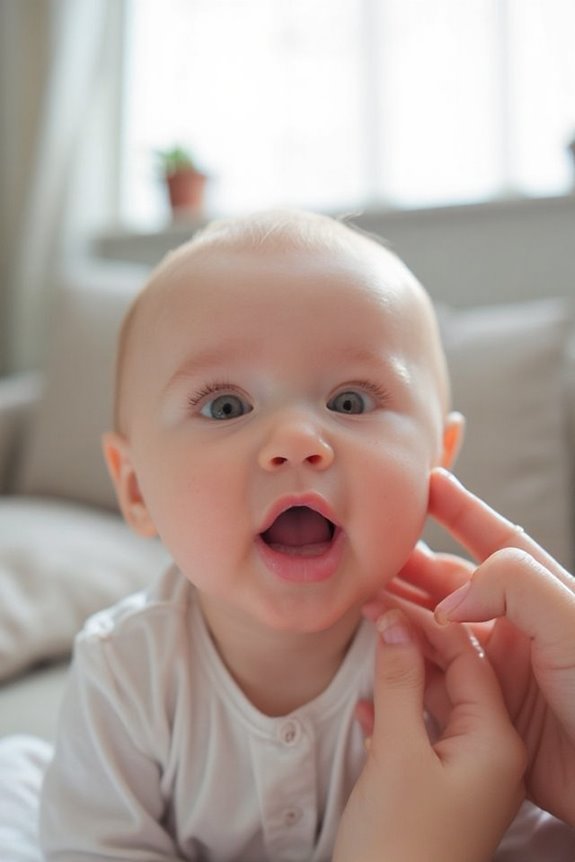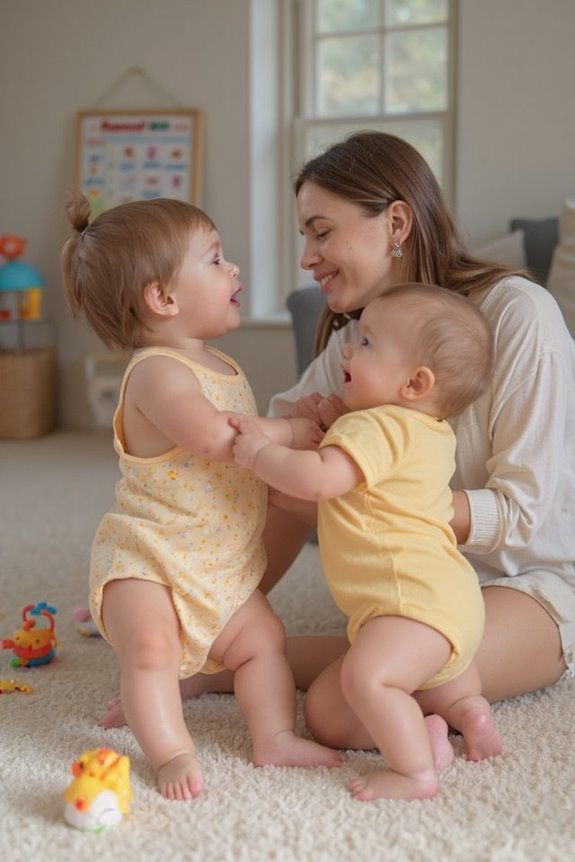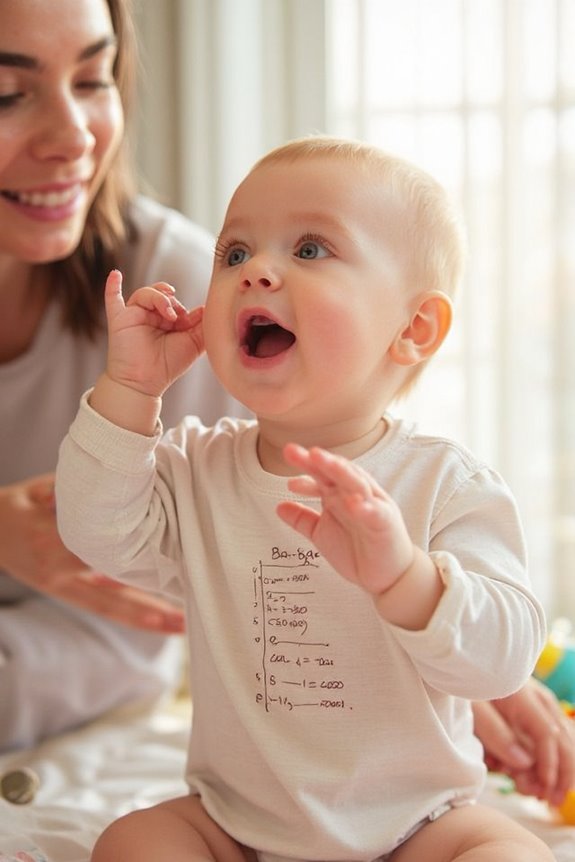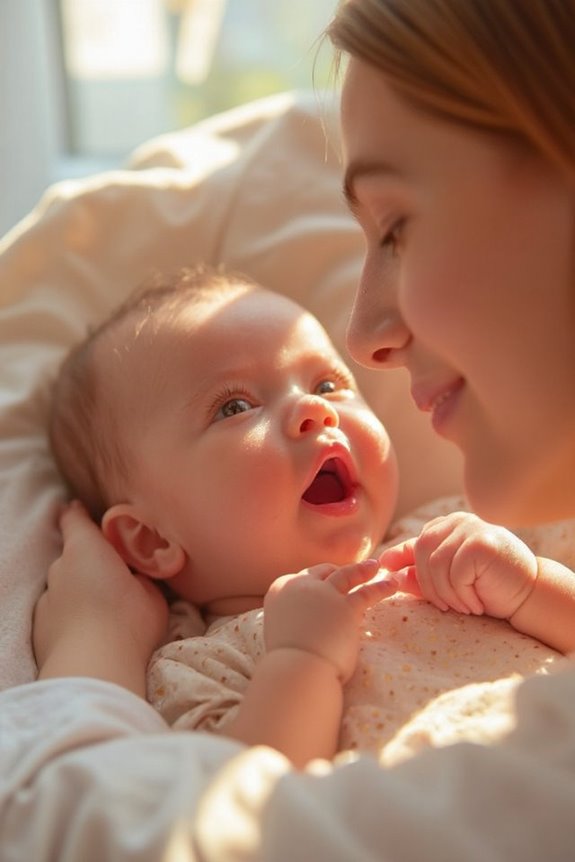Babies typically begin talking around 12 months, though this varies widely. Before actual words, they develop through stages: cooing (0-3 months), babbling (7-9 months), and recognizing basic sounds (6 months). First words commonly include “Mommy” and “Daddy,” with girls often developing vocabulary faster than boys. Regular interaction, reading, and responding to your baby’s attempts at communication greatly support language development. The journey from first sounds to complete sentences reveals fascinating developmental patterns.
Key Takeaways
- Most babies speak their first recognizable words around 12 months of age.
- The timeline varies widely, with some babies speaking as early as 7 months or as late as 18 months.
- Babbling and vocal play typically emerge between 7-9 months, preceding actual words.
- By 18-24 months, vocabulary rapidly expands as toddlers begin combining words into simple sentences.
- Social interactions, hearing ability, cognitive development, and language exposure all influence when babies start talking.
The Timeline of a Baby’s First Words
Four key stages mark the journey to a baby’s first words. I’ve found that most little ones follow this developmental path:
- 6 months: Babies begin recognizing basic sounds in their native language, developing language recognition skills through exposure
- 7-9 months: Babbling and vocal play emerge, with sounds like “ba-ba” representing early communication attempts
- 12 months: First words typically appear, though this varies greatly among children
- 18+ months: Vocabulary expands rapidly as communication skills develop
While most babies say their first words around 12 months, development varies considerably. Some children speak as early as 7 months, while others may not until 18 months. This range is completely normal and reflects individual developmental timelines.
Key Milestones in Speech Development
Watching for five essential developmental stages helps parents track their baby’s speech progress from birth through toddlerhood.
During the first three months, infants develop basic vocalization patterns, cooing when content and crying differently based on needs. From 4-6 months, auditory skills advance as babies turn toward sounds and respond to voice tone changes.
Between 7-11 months, repetitive babbling emerges (“ba-ba-ba”), while 12-17 months brings meaningful first words like “mama” and improved understanding of simple requests.
By 18-24 months, vocabulary expands greatly as toddlers combine words into simple sentences. Throughout this journey, babies progress from simple sounds to complex communication, though development timelines vary considerably among children.
- Watch for increasing sound complexity
- Note how your child responds to your voice
- Track word comprehension before speech
Factors That Influence When Babies Start Talking
While every child develops at their own pace, several key factors greatly impact when and how babies begin to talk.
Social influences play an essential role, with parental interaction and family dynamics directly affecting language acquisition. Children from highly verbal households typically develop stronger language skills earlier.
Perceptual challenges like hearing impairments can delay speech development, as proper auditory processing is vital for language learning.
Cognitive development underpins language acquisition, with brain development in the first three years being particularly important. Memory, attention, and processing speed all contribute to a child’s verbal abilities.
Linguistic exposure matters notably—multilingual environments and diverse language input can enhance development, though each child processes these experiences differently based on their individual neurological and social circumstances.
Common First Words and Their Significance
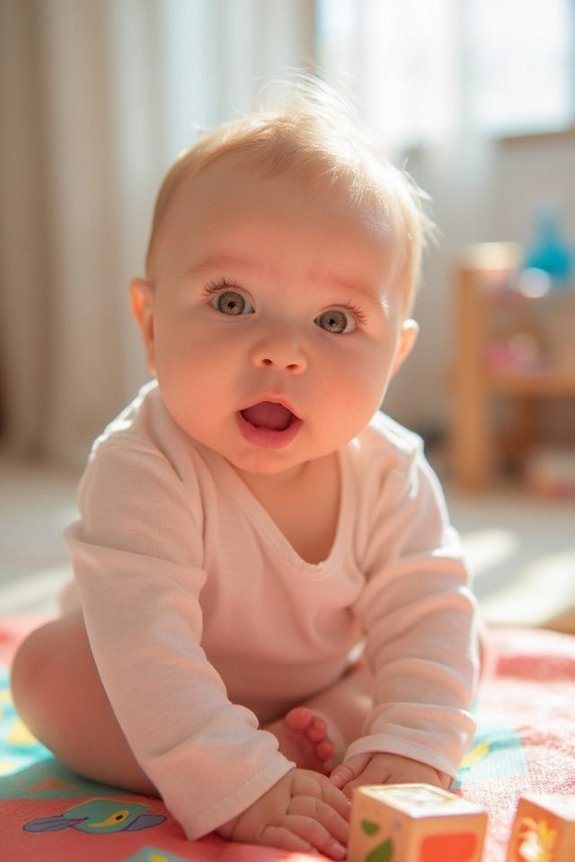
Beyond the developmental factors that shape a baby’s speech, the actual words they first utter tell us a remarkable story about human development. Research reveals “Mommy” as the most common first word across cultures, reported in 12 of 33 countries surveyed, with “Daddy” following closely behind.
These patterns highlight the first word significance across developmental timelines:
- Most babies (75%) speak their first word by 10-12 months
- Social relationships dominate early vocabulary, reflecting attachment priorities
- Girls generally develop vocabulary faster than boys in most countries
- Cultural variations exist—Australian and Greek babies often choose words besides parental terms
The consistency of relationship-focused first words suggests that language development is fundamentally tied to social bonding, regardless of linguistic environment.
How Parents Can Encourage Early Language Skills
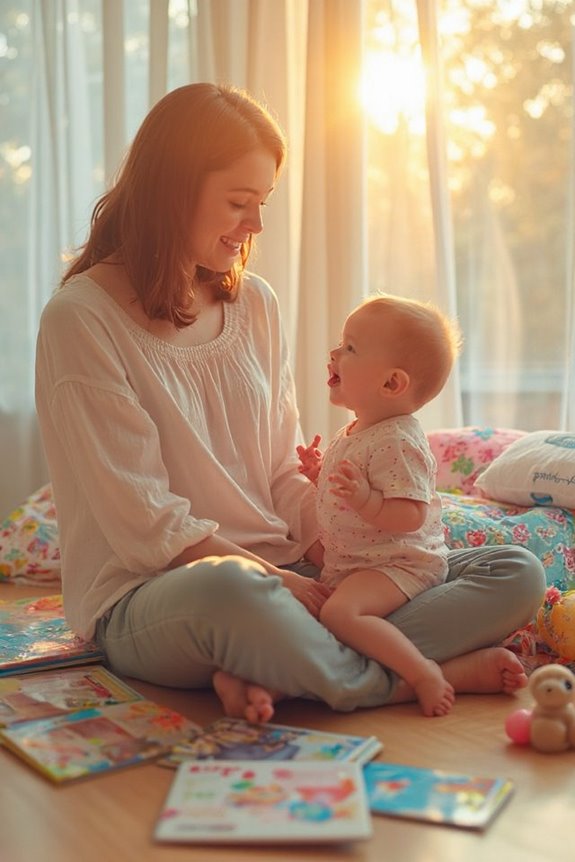
Although babies develop language skills at their own pace, parents play an essential role in fostering these abilities through daily interactions. I’ve found that consistent language exposure through reading strategies benefits infants from birth, even before they understand the words.
Interactive play creates natural opportunities for vocal imitation. When your baby coos or babbles, respond enthusiastically to reinforce these early communication attempts. Sound games that vary pitch and volume help babies experiment with their voices.
Try these simple approaches:
- Narrate your daily activities using clear, simple language
- Respond to your baby’s gestures, reinforcing gesture recognition
- Point to and name objects frequently
- Use songs and rhymes to highlight speech patterns
- Make reading a daily ritual with age-appropriate books
Frequently Asked Questions
Should I Be Concerned if My Baby Is Bilingual?
I’d say don’t worry! Bilingualism offers cognitive advantages despite temporary language confusion. Your baby’s developing normally—they’re just processing two systems simultaneously. Their combined vocabulary across both languages is what matters most.
How Do Speech Delays Affect Future Academic Performance?
I’ve seen how speech delays can impact academic success. Missing speech milestones often leads to reading and writing difficulties. Early intervention strategies are essential—they can considerably improve a child’s confidence, social skills, and classroom performance.
Can Technology Help or Hinder a Baby’s Speech Development?
I believe technology can do both. Excessive screen time may hinder speech development, but interactive apps can enhance it when used as tools for engagement rather than substitutes for human interaction.
Are There Differences in Speech Development Between Boys and Girls?
I’ve observed gender differences in speech development. While boys vocalize more in their first year, girls typically catch up and surpass them around age two. These speech milestones show fascinating developmental patterns I’ve studied.
Do Babies Who Talk Early Have Higher Intelligence Later?
Don’t judge a book by its cover! While I’ve seen research showing some correlation between early talking and intelligence, it’s not a guaranteed prediction. Environmental factors and genetics play significant roles too.
References
https://parentingscience.com/when-do-babies-say-their-first-word/
https://langcog.stanford.edu/papers/SYF_underreview.pdf
https://www.omegapediatrics.com/the-average-age-for-kids-to-start-talking/
https://www.whattoexpect.com/first-year/first-words/
https://www.pampers.com/en-us/toddler/development/article/when-do-babies-start-talking
https://www.parents.com/baby/development/talking/baby-talk-a-month-by-month-timeline1/
https://www.nidcd.nih.gov/health/speech-and-language
https://www.babycenter.com/baby/baby-development/your-childs-talking-timeline_10356902
https://www.medicalnewstoday.com/articles/when-do-babies-start-talking
https://www.chop.edu/health-resources/age-appropriate-speech-and-language-milestones

